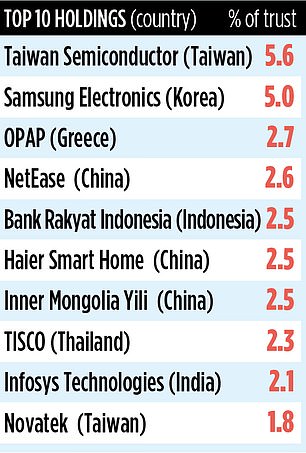JPMorgan Global Emerging Markets: £362million fund manages to deliver both income AND returns for investors
Emerging markets have long had a reputation for offering investors high-risk, high-return returns. But several funds investing in these stock markets now appeal to a wider audience by generating a mix of income and capital gains.
Among them is JP Morgan Global Emerging Markets Earningsa £356m investment fund listed on the UK stock market.
It provides shareholders with an annual income of more than four percent, plus capital returns on top of that.
The result is that the fund has achieved total returns of 10.1, 27.5 and 53.1 percent respectively over the past one, five and ten years. In the trust’s last financial year, which ended in July, it provided shareholders with an income of 5.3 per share, an increase of 1.9 percent on the previous year. Dividends are paid quarterly.
The trust is managed by Omar Negyal, who draws on the expertise of JP Morgan analysts located around the world in emerging market countries such as China and India for investment ideas.
Speaking from Hong Kong, where he is part of a two-week visit to China to address companies, Negyal says many emerging market companies are now more shareholder-friendly than they were 10 to 15 years ago.
“It is not unusual for companies to pay out more than a third of their profits in dividends,” he adds.
“Some emerging markets, such as Brazil, China, South Africa and Taiwan, are more dividend-oriented than others – while companies in Saudi Arabia and the United Arab Emirates are now paying out income in response to demand from local investors.”
Negyal says he has no problem finding suitable companies to invest in. To qualify for inclusion in the trust, companies must pay a dividend. The result is a portfolio consisting of 82 dividend-friendly companies, which pay out an annual income of at least one percent and in some cases even more than 10 percent.

The holding companies include household names including Taiwan Semiconductor, Samsung Electronics and Infosys Technologies.
There are also lesser-known stocks such as Thailand-listed TISCO, a consumer finance company. “It has a good track record, a strong balance sheet and pays dividends to shareholders,” says Negyal.
Although companies are purchased with a five-year perspective, the composition of the portfolio changes depending on the economic background. Fears of a global recession have prompted Negyal to reduce the fund’s exposure to technology companies.
“Taiwan Semiconductor has made a major contribution to the trust’s performance over the past five years,” he said. ‘It has a progressive dividend policy which we like, but we must accept that demand for its products will be affected by any downturn in the global economy.’
Once accounting for almost 10 percent of the trust’s assets, this position has been reduced to 5.6 percent. Nevertheless, it remains the fund’s largest holding. Other positions have been reduced on valuation grounds. For example, Mexico-listed retailer Walmex was in the top ten funds, but a revaluation meant it took profits.
China is the trust’s largest country position. Negyal says the negative narrative surrounding China’s economy in the wake of the global pandemic has allowed the trust to buy some quality companies at attractive prices. Among them is the Internet trading company JD.com, a company that now commits to paying an annual dividend.
The trust has annual fees totaling 0.92 percent, the market ticker JEMI and code B5ZZY91. Other emerging market trusts with an income gap include Utilico and Templeton.
